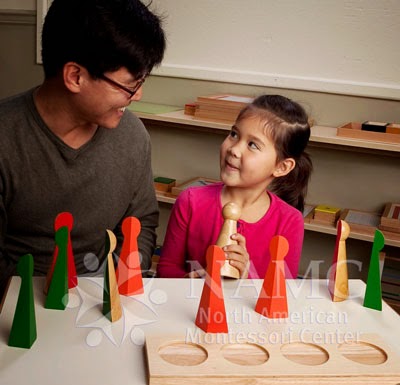
The results we obtain with our little ones contrast oddly with the fact that mathematics is so often held to be a scourge rather than pleasure in school programs. Most people have developed ‘mental barriers’ against it. Yet all is easy if only its roots can be implanted in the absorbent mind.
— Maria Montessori
The Absorbent Mind, p. 186.
The Absorbent Mind, p. 186.
Dr. Montessori tells us that it is human nature to distinguish between and order our world based on similarities and differences of perceived qualities. The world around us is made of precise rules that follow an exact, measured order. “In our work, therefore, we have given a name to this part of the mind which is built up with exactitude, and we all it ‘the mathematical mind.’” (Montessori, p. 185)
The Absorbent Mind Chapter 17: Further Elaboration, Part 3 - The Mathematical Mind
Montessori created the Sensorial materials to provide a “system of materialized abstractions, or of mathematics.” (Montessori, p. 186) Each material clearly and concretely demonstrates abstract mathematical concepts, such as diameter, height, width, length, area, and volume. In addition to seeing the ordered gradations and discrepancies in geometric form, the child is able to touch and manipulate each material to sensorially learn why and how each property works.

The child’s keen mathematical and ordered mind regulates and controls his world. From the arrangement of household furniture to the order of the toys on the shelf, every object in his surroundings helps him form impressions of his environment. When something is out of place, the child reacts against it until it is made right. Interruptions to a child’s daily routine can cause emotional turmoil because his world is out of order. When adults do not understand the source of these upsets, we often call the child’s behavior “naughty.” In reality, the child is attempting to communicate the frustration he feels while trying to make sense of the world around him.
Most adults tolerate disruptions with relative ease. The child, however, is extracting the truth and laws of nature from his environment. It is difficult to learn the rules when the rules seem to change haphazardly.

Throughout early childhood, the child is forming his personality.
He is learning that he has control over his surroundings. He is figuring out the habits and customs of his family and his environment. Through experience and reflection, the child begins to internalize social rules. And like a scientist, he questions, experiments, and draws conclusions: If I do this, then I can expect that to happen. He learns to discern patterns in his behavior that form the personality he will carry with him into adulthood.
It is not just the rules of the classroom or the laws of nature that follow ordered patterns. Our human needs, social interactions, systems of belief, and our behaviors follow ordered norms. Social patterns are not fixed; they change and evolve over time or by circumstances. Adapting to this change “is only possible if the new individuals born into it have a creative power, one which can adapt them to the circumstances into which they are born.” (Montessori, p. 190)
Works Cited
Montessori, Maria. The Absorbent Mind. Wheaton, IL: Theosophical Press, 1964.
As much as possible, NAMC’s web blog reflects the Montessori curriculum as provided in its teacher training programs. We realize and respect that Montessori schools are unique and may vary their schedules and offerings in accordance with the needs of their individual communities. We hope that our readers will find our articles useful and inspiring as a contribution to the global Montessori community.
© North American Montessori Center - originally posted in its entirety at Montessori Teacher Training on Thursday, July 17, 2014.
© North American Montessori Center - originally posted in its entirety at Montessori Teacher Training on Thursday, July 17, 2014.

The Absorbent Mind: Chapter 17, Further Elaboration Part3: The Mathematical Mind August 7,2014
ReplyDeleteIt can be very confusing for children as they develop and grow. They find themselves in a world full of rules and expectations. The need for the child to act or behave in a certain way, may seem frustrating as the child develop appropriate social interaction in their world.. However, as the child grows they learn and develop personality they carry with them into adulthood.